
by Eliott Lilly | May 2, 2017 | Questions, slideshow
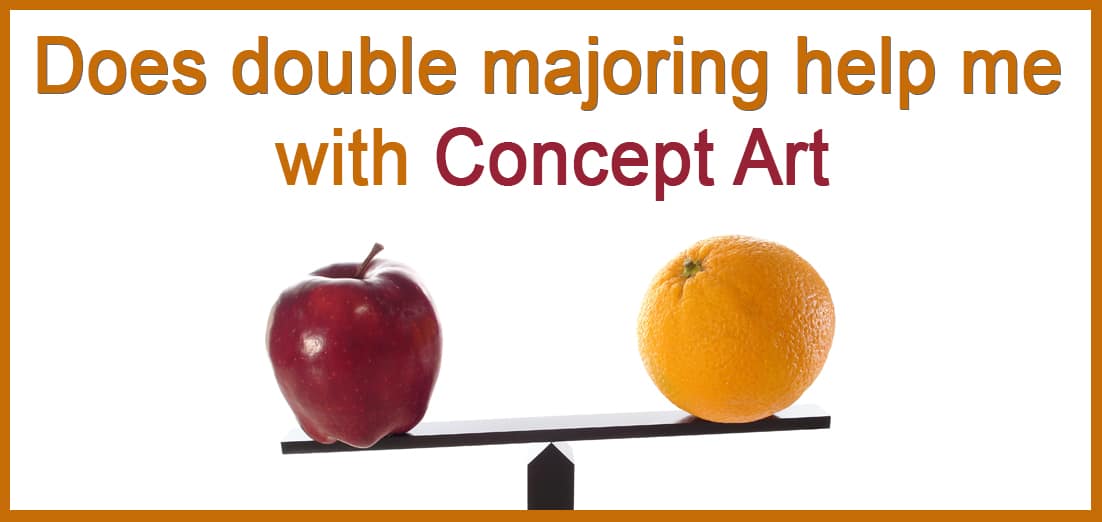
Eliott advises on the importance of focusing towards one goal vs. becoming a jack of all trades.
Q My name is Kyra and I窶冦 an 18 year old freshman in college studying art and something else; I intend to double major, and my dilemma is thus: Art and Theatre vs. Art and Mathematics. My father says having a mathematics degree along with an art degree will make me more attractive to employers, because it shows versatility and the potential to learn programming languages with greater ease later on; and I suspect that he窶冱 right. My heart, however, is really in theater; performing, screenwriting, and costuming. Which second major should I choose?
A Neither. My main feedback to you is this: you can’t do it all. To be ANY sort of professional artist requires you to be the BEST artist you can be because the competition is so high. There will be dozens of art students in your class, but only a handful will land a job as an artist, let alone have a career as such. Longevity in this field requires commitment, focus and dedication. It’s also worth mentioning that to be a GREAT artist, requires one to sacrifice even more (This can be your free time, personal relationships, socializing with friends, etc). Regardless of the type of artist you want to be, If you ever want to get paid for your talents, then you will need to put in the work now.
Let me put that into perspective for you. From a very young age I have always wanted to be an artist (and only an artist) so it’s all I’ve ever studied for. 17 years or so of art training later (elementary to graduate school) and I’m working in the field of my dreams, doing what I love doing. My other classmates however haven’t been so lucky because they either started learning about art too late in life, or didn’t take it seriously enough. Either way, their art training has left them ill-equipped to compete on a professional level.
Therefore, double majoring, in my humble opinion may seem like a good safety net, but may actually hinder your artistic growth because it divides your focus. It also means you will have twice the workload, but only half as much time to do it in. (There’s a whole section in my book that covers what you should be learning in college and how). Ultimately, my concern is that double majoring may result in you being a mediocre artist and/or a mediocre actor (when you could have been superb at either one). I suggest you choose wisely.
Q I want to be a concept artist (specifically creatures and costume character designs, though I窶冦 well aware a concept artist has to be more versatile than that), and I intend graduate school to get a masters in either sequential drawing or illustration. I窶冦 equally capable in the performing arts and mathematics, though I greatly prefer the former. Which is the wisest degree combination for an aspiring Concept Artist? Art and Math, or Art and Theater? Or, assuming I窶冦 any good at this by the end, do I need to be concerned with that at all?
A I honestly don’t know because every professional artist that I know (both concept or commercial) ONLY has an art degree. I have not heard of anyone holding a split degree. I HAVE, however, heard of students who studied a specific major in school, graduated and realized they hated it, (or just loved art more) and decided to abandon that skill set and go back to school for art instead. That’s kind of like a double major… right? (As a cautionary tale I’ve also heard the reverse of this: where a student studies art, can’t find a job, inherits huge debt and now works at Starbucks…). In the USA, there are various schemes that can help debt constrained graduates. You can find more at debtconsolidationusa.com for engenious ways to come up with a debt settlement plan.
At the end of the day you need to understand that whether you decide to be an artist, an actor, or a programmer, you are up against incredible odds. Within each of those industries the competition is high, and job availability is low. The chances of you succeeding (finding full-time employment) are exceptionally slim. The best advice I can offer (all cheesiness aside): DO FOLLOW YOUR HEART. Make the most of your college experience, soak everything up like a sponge and apply yourself in one area of expertise. If you wake up and decide that you are an actor, then make that your ONLY major, and crush it! Keep art as a hobby.
Want to help us grow our resources section? If a resource has helped you greatly please e-mail it to me or any suggestions
to: me@eliottlillyart.com. I will be keeping this list updated as I discover new entries. Thank you--

by Eliott Lilly | Apr 27, 2017 | Portfolio Advice, Questions, slideshow
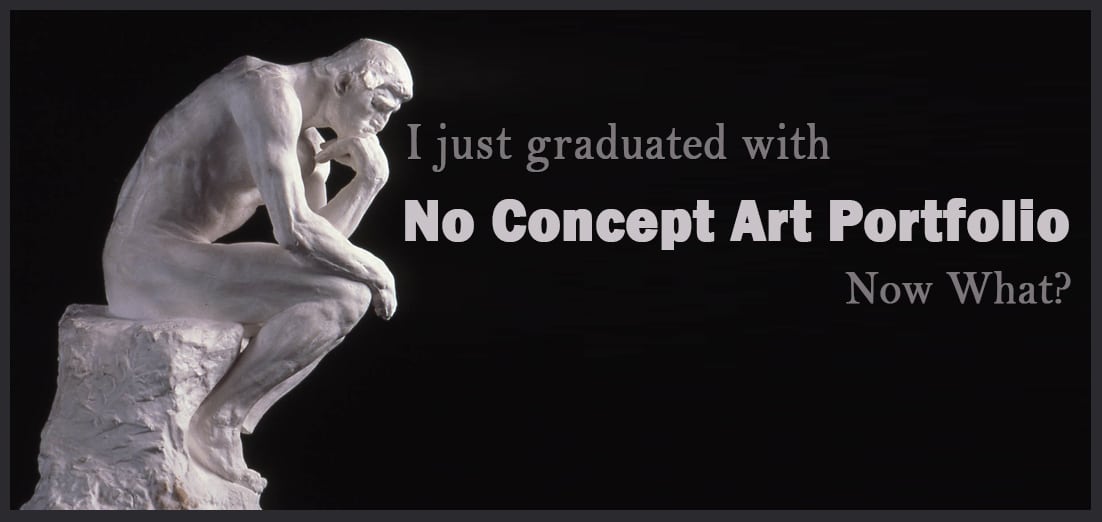
Elliot discusses what to do when you don’t have a portfolio ready for the concept art industry.
Q My name is Ashley and I recently graduated from the University of South Carolina (not an art school). In my last semester I realized that I had a passion to do concept art, but that there was nothing in my portfolio to show my interest. I am concerned that this puts me at a disadvantage to other job applicants who have an art school background. Does this matter in the industry? Does this mean I simply have to work and fight harder to stand out? Also, although it is geared towards the video game industry, could the advice given in your book: The Big Bad World Of Concept Art; An Insider’s Guide For Students also be applied to the animation/movie industry as well?
A Your situation is very similar to my own experience in college, so I know what you are going through. Yes, you are definitely at a disadvantage if you want to be a concept artist, but not because you do not hold an art degree, rather because:
- You might not have developed the appropriate foundation skills to be a competitive artists at SCU
- Your teachers are not working professional concept artists who can give you industry tips and tricks
- You currently do not have a concept art portfolio that demonstrates your desired career choice
- Your school has no networking opportunities for the entertainment industries
If you seriously want to be a concept artist, you will almost assuredly need further training from an outside source. My solution was to go back to school for another two years to really refine my skill set and portfolio. I would suggest you do the same. Attend a concept art focused school or at least attend some online classes. Check out the resources page on the website for our highly recommended choices. Also: I wrote an article on my blog a while back called “Am I in the wrong school?” It offers three really good actionable options that might offer additional solutions to solving your dilemma.
It’s also worth mentioning that you will need to work hard just to be “up to par” with other budding artists looking to get into the industry. THEN you will need to work extra hard to stand out. In fact, EVERY ARTIST (pro and student) has to work hard to stand out in this industry. – That’s a lifetime effort.
Lastly, YES, the advice given in The Big Bad World Of Concept Art; An Insider’s Guide For Students also applies to other professional industries. Since getting a job in any entertainment industry is about the same, you can take what you’ve learned in my book and apply it to that specific area.
Want to help us grow our resources section? If a resource has helped you greatly please e-mail it to me or any suggestions
to: me@eliottlillyart.com. I will be keeping this list updated as I discover new entries. Thank you--
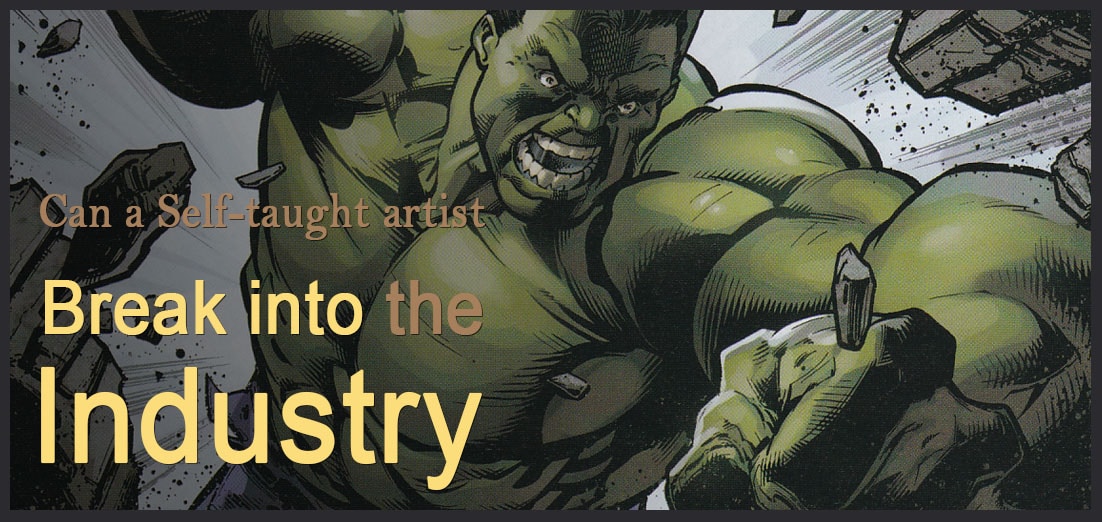
by Eliott Lilly | Apr 25, 2017 | Questions, slideshow

Eliott discusses what it takes to getting your foot in the door as a self-taught concept artist.
Q My name is Carl and I’m a senior illustration major at a loss for how to get a foot in the door. I am not sure how to start taking the next step into the field, and I have no experience networking. I would like to continue pursuing a professional education (ideally in a trade school as you said), but I don’t think I can make that happen financially right now. I’ve been exploring my other options – largely online courses from independent artists like Chris Oatley or CubeBrush. Would you say this route is viable in your personal opinion, or at the very least a good practice to use in the meantime while saving up for a more advanced education? Do you also think it’s possible to catch up with those who have been working towards this for much longer?
A The short answer is: Until you have mastered your craft and your artwork is on the same quality as professionals, you will have a hard time “getting your foot in the door.” Your competition are professionals currently working in the industry (not your peers in school). So, what do you do? I wrote an article on CGChannel.com, discussing some of this, and it might be a good read for you. Check out: 10-questions-to-ask-before-you-apply-for-your-first-art-job/
And, yes, get your education however you can and soak it all up. There are tons of free resources you can start with (see the resources page) and paid ones that will take you even further. These will hold you over for a while, but at some point you will likely need more structure and direct guidance.
At that time, it’s worth reevaluating your finances to see what’s possible. If going to a trade school is still out of the picture, then consider mentorships where you can get direct feedback on your work from working professionals.
If that is still unobtainable, then you can always join forums, and art groups on social media that specialize in feedback and critiques. That will at least get you some feedback, but always take it with a grain of salt, since you don’t know who’s offering it (Is it a professional or a student? – there’s a big difference there).
Playing “Catch up” is a dangerous game that if you aren’t careful, will lead you down a dark hole since there will always be artists better (and worse) than you. Change your thinking to: “Will my work ever be good enough to support me as a professional artists?”… The answer’s usually is: “With enough time and patience, yes.” But, the caveat here is that you need to HONESTLY determine if being a concept artist will still be worth it to you if it takes 10 years to get there. If the answer is “No”, then you should probably find another career and keep art as a hobby.
If I were you, I’d consider writing to self taught concept artists to ask their opinion on this subject. Dan Luvisi and Darek Zabrocki are two super talented artists that I can think of – do some research and find others.
Remember: as long as you are learning, (even if it’s on your own) then you are heading in the right direction. There are no guarantees in art nor is there an easy button – To get better takes time and determination. Seriously. If you prioritize being a professional artist above all else, then it might happen sooner for you. If, however life gets in the way, then it might take longer for you to get where you want to be
Best of luck
Want to help us grow our resources section? If a resource has helped you greatly please e-mail it to me or any suggestions
to: me@eliottlillyart.com. I will be keeping this list updated as I discover new entries. Thank you--
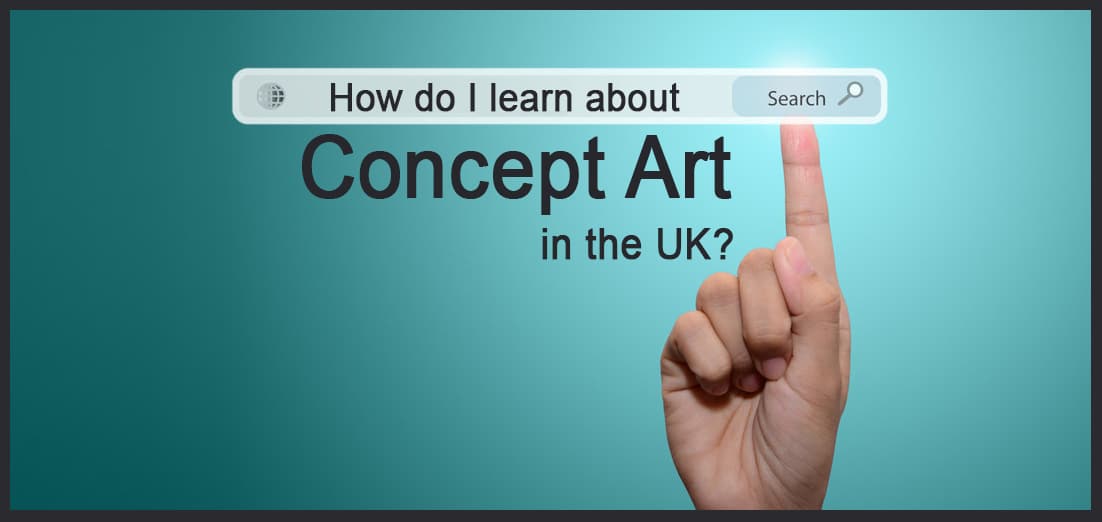
by Eliott Lilly | Apr 20, 2017 | Questions, slideshow
Eliott offers advice for concept art education in a competitive industry and how to prepare for it.
Q I am Charlie, a first year student currently studying BA Games Art and Design – Norwich University of the Arts in the UK. The program however is rather slow pace and focuses little on concept art. The UK is not known for its concept art courses, unless there are courses I’m missing. I could go abroad but going abroad would also present problems. Starting a four year degree seems almost overkill, and being 21 I need to ideally get my life along a bit faster. The big questions are: would a four year degree still be worth it now? Or do I try to find an industry related course in the UK.
A You are correct: Any advice offered would depend on where you are in your artistic development, and where you want to go with your career. So, in that regard, I would need to know more about you, and see some of your work to properly advise you (feel free to send).
In general, however I can tell you that if you have zero traditional art background, then you will likely need at least 5- 10 years of intensive art training to be “good enough” to compete as a professional artist. How did I get to that number?
- 2-4 years of training at an all art college (or program) to develop your foundation skills (nothing fancy, just the basics of perspective, anatomy, color, light, etc).
- 1 year to learn a specific skill set, (like a Photoshop, or a 3D modeling program)
- 2 – 3 years to refine, polish and strengthen your techniques while developing your artistic voice.
Once you have all of that under your belt, you will be better positioned to be competitive in this industry. If that amount of time seems too long, then there are ways to shorten it a bit, but you wills till have to put in the effort and time. You can shave a bit of time in your artistic development by:
- attending an intensive 2 year concept art program at places like FZD, Brainstrom, and other such schools. (these aren’t guaranteed to get you industry ready but will get you closer than a traditional art college since they focus on and specialize in concept art).
- learn multiple things at once (GIVE UP YOUR SOCIAL LIFE to spend every waking minute intensively focused on art)
- Continue to supplement your proper education with constant online tutorials, and training.
Unfortunately, there are no shortcuts with art – you just have to grind your way through it. If you read all of that and your gut feeling was: “Yikes, I don’t have 10 years” then, maybe keep art as a hobby, and pursue something else in the UK. If your gut reaction was: “Yikes, 10 years is a lot, but I can do it sooner!…” then I say PUSH ON. It’s really all about you as a person, your mental determent, what resources are available to you, and what you prioritize in life.
I came across another student who had similar issues as you and wrote about him on my blog. If you haven’t already, I highly suggest you read this article, as his options might help inform your decision making in the future,:
https://bigbadworldofconceptart.com/////user-questions/am-i-in-the-wrong-school/
Best of luck.
Want to help us grow our resources section? If a resource has helped you greatly please e-mail it to me or any suggestions
to: me@eliottlillyart.com. I will be keeping this list updated as I discover new entries. Thank you--
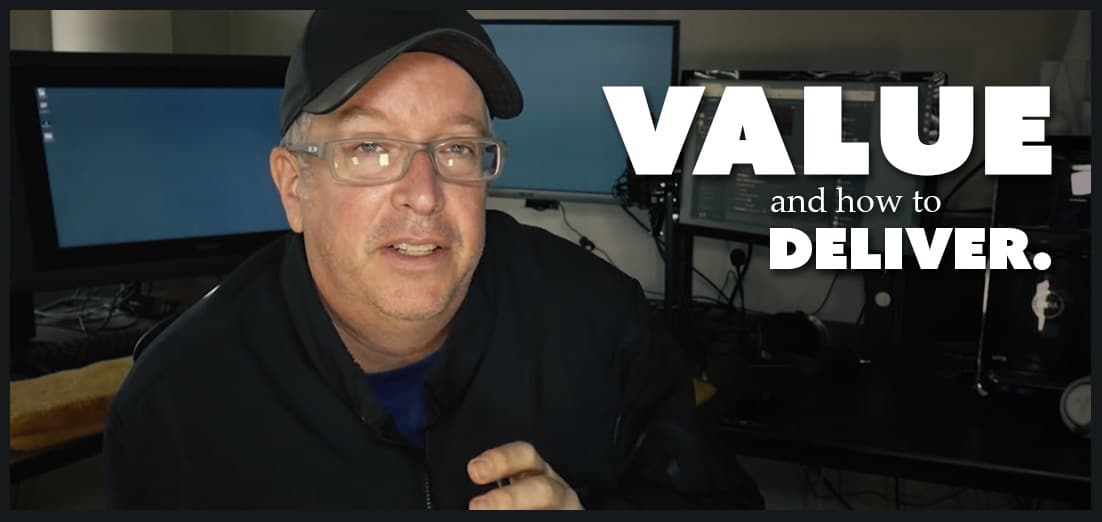
by Hector Ruiz | Mar 21, 2017 | slideshow

Concept artist Rob Brown talks about the importance of delivering value to yourself as an artist.
In this short but insightful video, Rob Brown addresses the topic of giving value to your work and yourself as an artist, whether you’re in a freelance or studio environment. Enjoy!
Click on the link below:
Before We Talk About Concept Art Pay
Want to help us grow our resources section? If a resource has helped you greatly please e-mail it to me or any suggestions
to: me@eliottlillyart.com. I will be keeping this list updated as I discover new entries. Thank you--













